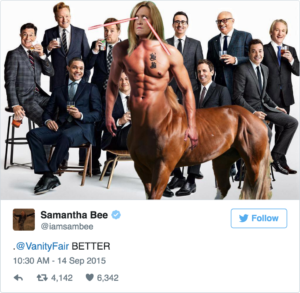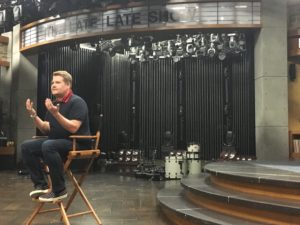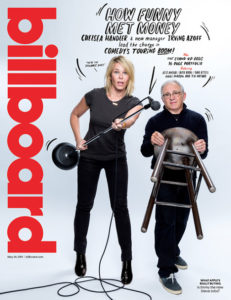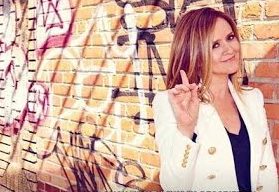
After Vanity Fair’s October issue bluntly displayed a late-night cast of all men, Samantha Bee fired back on her Twitter.
In an age where we might see the first woman become President of the United States, late-night television remains a sausage fest.
“I think it’s terrible. I mean, I think all these gentlemen are very good and very talented, but why a glass ceiling on late night? I don’t get it,” comedian Carol Burnett of “The Carol Burnett Show” said in a 2015 interview with Extra.
Burnett has a point. Of the 11 late-night shows currently on network and cable television (including Conan O’Brien, Stephen Colbert, Trevor Noah, Jimmy Kimmel, James Corden, John Oliver, Seth Meyers, Larry Wilmore, Jimmy Fallon, and Bill Maher), a woman hosts only one of them– Samantha Bee.
Daytime television, however, is a whole other story. Women host all seven of the daytime shows currently on the airwaves, either in part or in full. Such women include Kelly Ripa, the cast of The View, and Ellen Degeneres.
“…women have often been looked at as risky, which is absolutely absurd.” – Victoria Nones, comedian
“Everybody’s so used to having a man [in late-night]. This is what it’s primarily been,” said Chicago-based comedian and Women in Comedy founder Victoria Nones.
“From a business standpoint, you obviously want to minimize your risk as much as possible, and I think what’s unfortunate is women have often been looked at as risky, which is absolutely absurd given that we make up more than half of the population,” she said.
The disparity is clear, but why does it matter?
According to “Strange Bedfellows: How Late-Night Comedy Turns Democracy into a Joke” by Russell L. Peterson, “nearly a quarter of Americans between the ages of 18 and 29 get their campaign news from comedy-TV shows,” and that “young people voting under the influence of humor could very well swing the election,” a 2004 Pew Center for the People and the Press report showed.
Whether or not late night hosts wish to be held accountable for this (see Conan O’brien’s dismissal of news-related responsibility), they are in the position to make news accessible and palatable for young audiences by blurring reportage with performance art.

“Right now there has never been a greater thirst for content,” said James Corden, seen here on the set of his talk show, “The Late Late Show” at CBS Studios. (Photo by Madeline White)
Although the current hosts’ personalities are diverse, the platform remains one-sided. “The rare privilege to come into millions of American living rooms to talk about matters political is given only to the cool, un-‘ethnic,’ unaccented ‘everyman’ (accent on the ‘man’),” writes Peterson.
This is not to say, however, that there have never been any women in late night. In the early 1980s, Johnny Carson, an American icon who is known for pioneering the late-night genre, introduced audiences to the first-ever female late-night host: the late Joan Rivers.
“EVEN IF THEY’RE MORE FEMININE OFF STAGE, THEY GET KIND OF MASCULINE AND TOUGH ON STAGE.” – ERICA RHODES, COMEDIAN
Following a barrage of well-received appearances on “The Tonight Show Starring Johnny Carson,” Rivers became his permanent guest host with her brash, “no holds barred” style of comedy from 1983 to 1986.
But when Rivers was given her own show, the tide turned against her. The then-new Fox network broadcast “The Late Show Starring Joan Rivers,” but it was cancelled after only six months.
Since then, few female late-night hosts have graced the broadcast television airwaves, and those who did get on-air were quickly taken off due to poor ratings. The major networks, which comprise ABC, CBS, NBC, Fox, and The CW, have proven unsuccessful in integrating women into long-running late-night gigs thus far.
Cable channels, however, are providing opportunities for lady comics aspiring to these positions.
The E! Channel’s “Chelsea Lately,” hosted by New Jersey-born comedian Chelsea Handler, became the longest running female-driven late-night show in history, with its seven year run from 2007 to 2014.
Former “Chelsea Lately” producer Jake Wachtel said Handler’s success can be attributed to her non-conforming style and individuality.
“If you look at how Joan Rivers owned her space, Chelsea owns her space,” he said. “They were them.”
 Wachtel added, “I don’t think that the low ratings of some female hosts is indicative of if you have the right talent, and the right fit. Chelsea Lately is a perfect example of that. She hits. She’s not everybody’s favorite. So is Jimmy Kimmel. He’s not everybody’s favorite. But she has a very strong, very loyal audience.”
Wachtel added, “I don’t think that the low ratings of some female hosts is indicative of if you have the right talent, and the right fit. Chelsea Lately is a perfect example of that. She hits. She’s not everybody’s favorite. So is Jimmy Kimmel. He’s not everybody’s favorite. But she has a very strong, very loyal audience.”
Comedian Eliza Skinner said Handler’s success in the late-night arena can be partly attributed to her naturally assertive style. “I think that’s why Chelsea Handler has come the closest to looking like a regular late-night show because she has a certain masculinity to the way that she acts and presents herself. There’s a hardness,” she said.
“I DON’T THINK THAT THE LOW RATINGS OF SOME FEMALE HOSTS IS INDICATIVE OF IF YOU HAVE THE RIGHT TALENT.” – JAKE WACHTEL, FORMER “CHELSEA LATELY” PRODUCER
Although Skinner and Wachtel believe Handler’s “hard” style to be innately “her,” stand-up comic Erica Rhodes said there are several female comics who pretend to be more masculine than they really are when they get onstage.
“Women in comedy almost feel the need to be like men. They do the ballsy, tough act— the kind of ‘in-your-face,’ ‘don’t-mess-with-me’ act,” Rhodes said. “Even if they’re more feminine offstage, they get kind of masculine and tough onstage.”
“It seems superficially empowering,” she added. “Because you’re like, ‘Oh she’s so strong, she’s so tough,’ but then you see the person offstage and you’re like, ‘That’s not really who she is.'”
Ultimately, so it seems, the low ratings of female hosts may be attributed to a societal-engrained plight of, “I have to be like men to be funny.” And as Wachtel put it, authenticity is the key to late-night hosting success.
But the times, they are a changin’. As of earlier this year, one comedienne has found a way to enter the late-night scene in a fashion all her own.
By breaking standard format—the format that’s proven successful for male hosts for nearly five decades— she is separating herself from the rest, meanwhile using her life experience as a woman to her advantage.
America: meet Samantha Bee.
